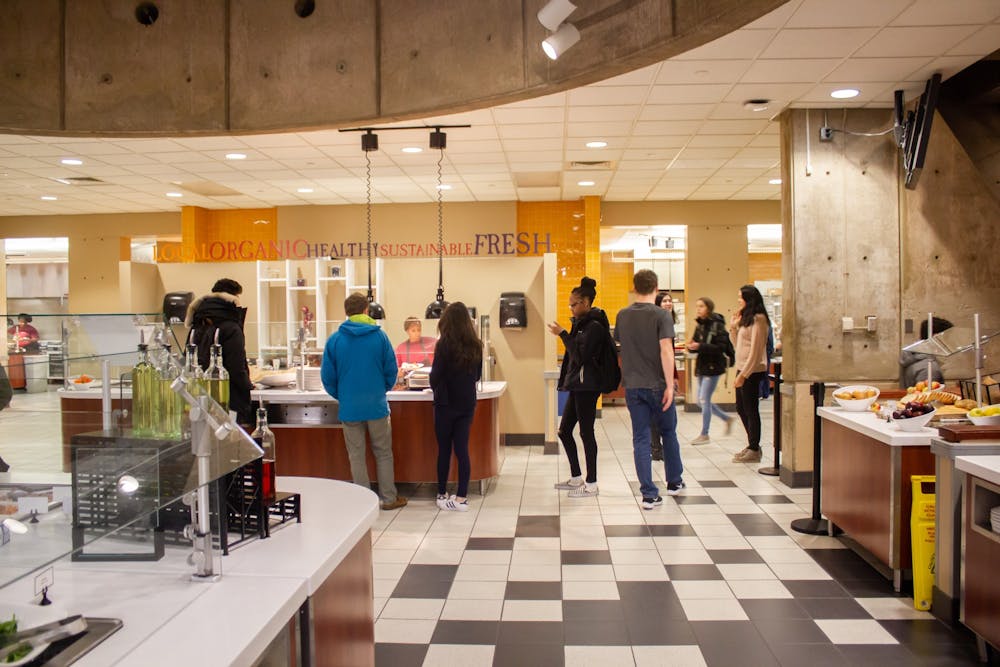Food. Everyone needs it, much of our social life depends on it, and most cultures pride themselves on their take on it. Eating at Penn takes place in many areas, from a snack on Locust to a multi-course experience on South Street. But one of the most common places to find food is in one of Penn’s five dining halls. For the past ten years, Penn’s dining halls (and nearly all food outlets on campus) have been managed by Bon Appétit, a California company which manages over 1,000 “cafés” across the United States.
But while Bon Appétit’s chipper website highlights its published positives, many members of the Penn community have left the dining halls feeling underserved and displeased. Ten years in, it is time for Penn to reevaluate the quality of our dining facilities and reconsider the services Bon Appétit provides.
Providing food for over 10,000 undergraduates is no small challenge. It is crucial to the wellbeing of all students that they be well-fed. To this minimum standard, Bon Appétit fulfills its job; after all, they do provide food. But in a culture where social life often revolves around food, this can not be the standard with which we judge our food provider. We must ask more of the company that literally feeds us.
Many problems are known to exist in our dining halls. Members of the vegetarian and vegan communities have lodged complaints about the lack of this food. Menu changes have little effect (especially when dining halls are set up as stations). Students have even become sick after eating at Penn Dining. Based on a recent post in the first-year Facebook group, roughly 30 students appeared to have gotten food poisoning from undercooked chicken at Hill during reading days, for instance. And it doesn’t take long standing in line at a dining hall to hear employees lament their working conditions and environment.
But these problems are known facts — ask students on campus and you’ll likely get personal answers on why the dining halls are bad. But to extend a parable to a company, you can judge a company’s character not by its faults, but by how it fixes them. On this front, it appears Bon Appétit has made little headway.

According to personal conversations I had with several members of the Penn Dining Advisory Board (which officially advises the Penn Dining administration), Bon Appétit management is often slow-moving or unresponsive to changes they propose or questions they pose.
Several flaws with Penn Dining, such as meal plan costs and swipe conversion, have been written about for years. There has been no movement — not even a statement — from Bon Appétit explaining the high cost and relative lack of flexibility of the dining plans. While they have made more opportunities available for students to convert swipes into non-dining-hall food, these are still little consolation to the extra swipes many students have that disappear at the end of the semester. Further, as Sophia DuRose pointed out in a recent column, even the retail opportunities in the Penn Dining system are not financially accessible to all members of our campus community.
SEE MORE FROM ALFREDO PRATICÓ:
From Kendra Brooks to Carey Law, student voices can effect change
At this point, one must wonder what can be done. Bon Appétit’s reach into the Penn ecosystem is so vast that it would be difficult to remove entirely, and the cost of turnover of dining service providers could be very expensive. But as Barbara Lea-Kruger, director of communications and external relations for Penn Business Services said, “I think there are a lot of cooks in this kitchen. Some of [the decisions] are made by the Provost's office, the cost [of the dining plan] is set by the Trustees, Bon Appétit makes some of the decisions … there’s not one person making all of the decisions. It makes things complicated.” According to her, Penn Dining and others involved in the process go through student surveys and try to implement feedback as best they can. But, as she noted, “some things just take a long time.”
To improve our dining, we must demand more. Our on-campus dining options should be a place where all classes and people congregate, not a place younger students frequent and older students try to avoid. Making a friendlier campus culture begins here, and we must demand it at all levels of administration.
Penn must apply pressure and encourage Bon Appétit to place a premium on broadening and improving Penn Dining’s offerings and food availability. Our food should fit our desires, not those of a company. If not, our campus and our stomachs will pay the price.

ALFREDO PRATICÒ is a College freshman from Philadelphia, Pa. His email address is pratico@sas.upenn.edu.
Alfredo Praticò is the 137th Opinion Editor for the Daily Pennsylvanian is formerly wrote a column entitled The Angry Philadelphian. His email is pratico@thedp.com.









